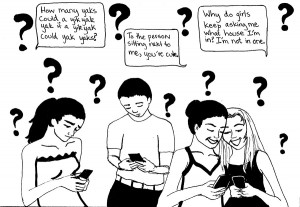Yik Yak breeds rumors and cyberbullying
Over the last few years, social media has become a place for many to share opinions quickly, publicly and — in many cases — without immediate consequences. Apps such as Yik Yak, however, have taken things further by allowing users to post messages anonymously, a move that opens the door to hateful rumors, bullying and other types of internet harassment.
Co-founded by Furman University graduates Tyler Droll and Brooks Buffington in 2013, Yik Yak has become active on approximately 250 campuses. According to Business Insider, 2,000 people signed up within the first day of the app’s launch at one university. This is no surprise. Yik Yak, an app aimed at college students, allows users to share any thought with anyone linked within the same approximate area. According to ABC News, Droll said that the app was originally intended to resemble “a city’s central plaza or campus bulletin board.” This bulletin board, however, in a little more than half a year, turned into a space that facilitates cyberbullying and rumors.
At USC, Yik Yak’s popularity and prevalence within the student body has spawned all types of issues associated with social networking. One example is the rumor floating around this month of sexual assault at USC’s Lambda Chi Alpha fraternity. Though the details of the rumored attack haven’t been released to the public, what little written evidence there is comes from comments and stories posted on Yik Yak. What makes Yik Yak dangerous in such situations is that it creates an atmosphere that facilitates the spread of rumors — whether they are true or not. In the case of this possible fraternity scandal, the most disturbing comments range from “No means yes and yes means anal said lambda #butactuallyf-ckrape” to “I’m by Lambda. Might as well lube up.” The frivolity of both messages mocks the traumatic pain and horror that victims of sexual assault experience. This case demonstrates horrific misuse of a powerful communication tool.
Though these comments were terrible, other posts still remind us of the possible good that social media can bring about in a community. “No matter what happened, it doesn’t make the way people responded to even a possible rape any less disturbing,” one user wrote. Whether he or she had been responding to the statements made earlier on Yik Yak or just the entire scandal in general, the individual seemed to understand the gravity of the situation by acknowledging that such jokes are crude. Clearly, Yik Yak does offer the chance for people to come out and spread positive messages, showing that it could potentially have great uses. In this situation, though, the negative outweighs the positive.
Several factors could explain why anyone would think it appropriate to make heinous comments about such a serious incident. First, there is the lack of compassion and empathy in people when they can hide behind a screen. According to Collective Evolution writer Jeff Roberts, “For the most part, people don’t speak to one another in public as they do online, instead there is usually a mutual respect for someone else’s opinion and equal reciprocation within a conversation or debate.” The lack of face-to-face interaction makes it easier for people to leave respect out of the picture. The element of anonymity just makes things worse because it not only enables, but also protects those who want to start rumors or harass others.
In fact, on the app, cyberbullying is evident every day. From just this week’s posts in the USC area, someone wrote, “The real question is: do freshmen have sex with their lanyards on?” Such a comment singles out and pokes fun at a class of students who should feel welcomed by the rest of the Trojan Family. Since no one is held responsible for anything said, these types of messages can be posted for all to see.
It is imperative that people begin to censor themselves and realize that posts — especially when anonymous — can have devastating consequences. Without careful evaluation, the idea of anonymity has the power to destroy the productivity of internet tools, such as Yik Yak, that have potential to do good.
Chelsea Hernandez is a senior majoring in English (creative writing). Her column, “Foot in Mouth,” runs Wednesdays.


